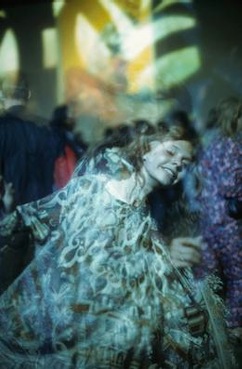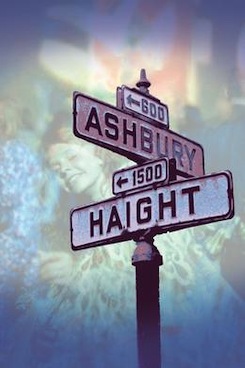Melting pot: San Francisco's hippie trippy shakeup
04/23/07 03:08 PM


By ED BARK
Oh happy daze. It's been nearly 40 years since San Francisco's Haight Ashbury district weeded out the "straights" and welcomed in the weed, LSD, hash-hish and riff-raff. Unfortunately there were far too many of the latter, and that's what screwed things up.
The neighborhood's brief heyday as a tie-dyed utopia is reprised in Summer of Love, a new American Experience presentation in which a very young Jerry Garcia says, "We would all like to be able to live an uncluttered life."
Premiering Monday, April 23 on PBS (check your local listings), the one-hour film suffers from being too clinical. At times it feels like an episode of Nova when it should be a swervy, freewheeling trip. The defining music of those times is too little-heard or referenced, with Scott McKenzie's still melodious "San Francisco (Be Sure to Wear Some Flowers In Your Hair)" a welcome exception. Probably the music rights otherwise were too costly for public television, a definite sign of these times.
Narrator David Ogden Stiers of M*A*S*H fame says the 1967 rush to turn on, tune in and drop out in Haight Ashbury made for "the largest migration of young people in the history of America."
They clogged the streets, parks and sidewalks while alienating many of the townies. California Gov. Ronald Reagan campaigned against his state's newfound wealth of day trippers, who were "just being complete fools" by taking LSD and many other available hallucinogens.
Tour buses tripped, too, taking vacationers to the zoo so to speak. Summer of Love includes telling footage of old ladies and business-suited men being schooled in hippie-speak and the like from the safe confines of a Gray Line cruiser.
Actor Peter Coyote lived those times to their fullest. He remembers the initially altruistic search for better lives through chemistry.
"We thought culture is much more important than politics," he says.
Kids arrived from all over the place, many of them fleeing unhappy homes.
"It was like arriving in Wonderland," says Sandi Stein, who was 13 at the time and tired of hearing her parents yell at each other.
"Racism was supposed to be really unhip," remembers Claudia King Yunker.
But Haight Ashbury quickly became a haven for dealers of hard-core, addictive drugs. Heroin, cocaine and speed firmed their iron grips. The "spiritual awakenings" that some sought quickly became a hackneyed, old-time religion in the minds of many.
A "Death of Hippie" parade and funeral symbolically brought down the curtain in fall 1967. Still, other parts of the country remained eager to play. Idealism wasn't dead yet. Nor were the stimulants that helped fuel it.
I was just starting Marine Corps boot camp in San Diego when Haight Ashbury began decaying from within. The drug culture would flourish into the mid-1970s, though, affording ample time to catch up in both Southern California and Madison, Wis.
Let's just say I didn't get cheated in those years. But that was then, and this is just a chance to look back through the eyes of the imperfect but evocative Summer of Love.
You don't need rose-colored glasses to see that at least they gave it a shot.
Grade: B
